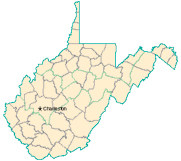 At least 41 percent of West Virginian economic development professionals responding in a new survey rate their area’s existing broadband service as “not very good,” a result that could have profound implications for high tech economic development in the state because of poor quality business broadband service.
At least 41 percent of West Virginian economic development professionals responding in a new survey rate their area’s existing broadband service as “not very good,” a result that could have profound implications for high tech economic development in the state because of poor quality business broadband service.
Some of the results of the survey, conducted by Internet Service Provider Citynet:
- 77% said government involvement in steering broadband policy was “very important.”
- 78% believe modern, reasonably priced broadband Internet infrastructure is “extremely important” or “very important” in competing against other locations for jobs.
- On a 10-point scale, broadband Internet infrastructure (8.56) rates as slightly more important than road improvements (8.26) and water infrastructure (8.26).
“Seventy-eight percent of respondents say it has been their experience that businesses considering locating in their areas place high priority on access to affordable, high-speed Internet when evaluating site selections,” said Jim Martin, president and chief executive officer of Citynet. “And 66 percent say cost and capacity of broadband service are factors more than half of the time when discussing new business prospects.”
 Some participants in the survey said they are losing business prospects in part due to the lack of broadband capacity, its speed or cost. Most of the professionals said they were “very familiar” or “somewhat familiar” with broadband expansion programs, such as middle-mile infrastructure, being implemented in adjoining states.
Some participants in the survey said they are losing business prospects in part due to the lack of broadband capacity, its speed or cost. Most of the professionals said they were “very familiar” or “somewhat familiar” with broadband expansion programs, such as middle-mile infrastructure, being implemented in adjoining states.
In West Virginia, most broadband expansion is being done by “last-mile” service provider Frontier Communications, which took over most of the state’s landlines from Verizon. For most homes and businesses outside of areas where cable companies compete, Frontier provides DSL broadband service ranging from 1-3Mbps in smaller communities, perhaps 7Mbps or slightly better in larger cities.
West Virginia has proved to be one of the least impressive states for broadband owing to its terrain and large number of rural communities, providing few incentives for robust competition. That has meant slow speed service at high prices.
Survey respondents were less than impressed:
- “I have a project pending [and] will probably lose it based on costs of broadband.”
- “The lack of high speed service in the rural areas totally extinguishes the possibility of new small business start-ups.”
- “Prospects don’t look here because of the lack of high speed, affordable, reliable broadband…. Current speeds of up to 3 mb while may be suitable for residential use are not suitable for business.”
- “Not only do too many areas still not have broadband, but too many places where people live do not have it and that affects the quality of life issue when attracting a prospect to live, work and play in WV.”
- “We were looking at a possible location of a data center and the lack of affordable, large capacity broadband was a deciding factor in them not locating in WV.”
- “We need the middle-mile and trunk-line services in West Virginia to remain competitive for many of today’s industries. What good is it if we get high-speed to every place in West Virginia, when we can only reach each other and do not have the facilities to get out of the state and into the major lines?”
- “[We] lost a company that looked at an existing building located in an area that doesn’t have high-speed access. They ended up locating in another area.”
- “You are not in the game without it.”
- “What are we waiting for?”
 Citynet has a dog in this fight. Martin has tangled with Frontier Communications in the past year over broadband stimulus funding and where taxpayer dollars are being spent in the state. While Frontier has touted “fiber projects” in West Virginia, those are primarily directed at increasing capacity for Frontier’s middle-mile network between its telephone exchanges, in hopes of expanding DSL further out into rural areas. The company is also trying to address congestion issues that have grown since buying out Verizon’s landline-based broadband business.
Citynet has a dog in this fight. Martin has tangled with Frontier Communications in the past year over broadband stimulus funding and where taxpayer dollars are being spent in the state. While Frontier has touted “fiber projects” in West Virginia, those are primarily directed at increasing capacity for Frontier’s middle-mile network between its telephone exchanges, in hopes of expanding DSL further out into rural areas. The company is also trying to address congestion issues that have grown since buying out Verizon’s landline-based broadband business.
Martin has criticized state officials for supporting Frontier’s efforts because the company will end up owning and controlling the network built, in part, from taxpayer dollars.
Stop the Cap! hears regularly from ordinary consumers in the state who are dissatisfied with their broadband choices, especially when they come from just a single provider — Frontier. Slow speeds, poor service, and repeated service outages have been documented here and by the state’s local media. Some outages are attributable to Verizon’s poor quality infrastructure (now owned by Frontier), others to Frontier’s unwillingness to replace that infrastructure — instead choosing to repair it, even if further outages occur later.


 Subscribe
Subscribe
West Virginia isn’t a cesspool filled with inbred hillbillies like the jokes and stereotypes would have you believe. We want to be a modern, active participant in 21st century commerce and technology. We can’t do it as things stand now, and we can’t do it alone. Some telecommunications company – and I don’t really care which one – needs to realize that there’s not only a great deal of interest, but also lots of promise and opportunity here. Or, in their terms, there’s money to be made. They just want a quick turnaround on their investment, and there’s no way… Read more »